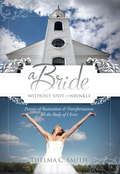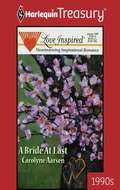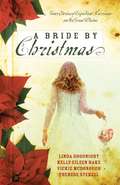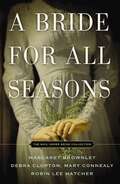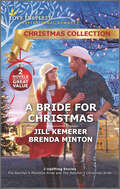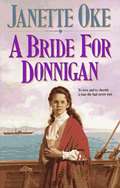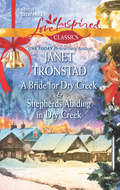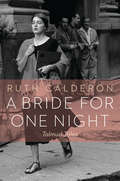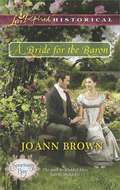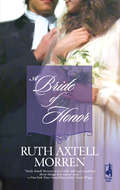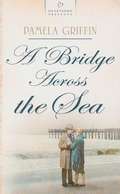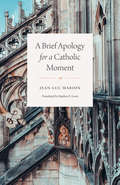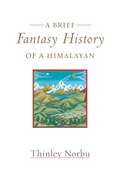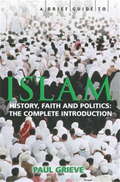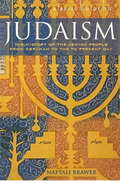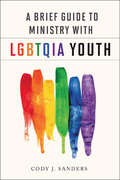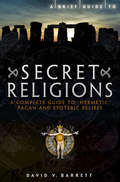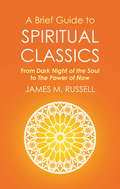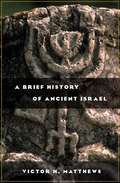- Table View
- List View
A Bride Without Spot or Wrinkle: Prayers of Restoration & Transformation for the Body of Christ
by Mrs. Thelma C. SmithAuthor Thelma C. Smith gives a call to all believers to join her in praying for the body of Christ, the church, to become the bride Christ desires. Readers will be given key scriptural verses to speak forth God&’s Word and move in preparation to receive all of God&’s promises. Understand the Lord&’s relationship with the church and how it is paralleled to an earthly covenant marriage between man and wife. Various prayer targets are given to focus on strongholds of the enemy for deliverance of women, marriages, children, and families. These simple, quick prayers will help transform the body of Christ into the bride without spot or wrinkle that Christ is returning for in the last days.As a small prayer booklet, Smith lays out specific Bible verses to help readers in their Bible study of how the relationship between Christ and the church is relevant to the relationship between a husband and wife. Women will be drawn to the focus of God&’s plan for them and will receive restoration for past hurts. Prayers in each chapter engage the reader to take on the enemy, Satan, and stand in faith to see change within the church.
A Bride at Last
by Carolyne AarsenA Bride at LastThe return of Clint Fletcher had the whole town buzzing -- and Nadine Laidlaw wondering. Because this unforgotten, unforgettable man had made it clear he'd come back forher. And she just wasn't sure she could believe in the love they had both denied for so long. A Mother at HeartMiriam Spencer returned to her hometown in search of the simple faith she'd lost. But she found widower Jake Steele -- the man she'd always loved -- and his sweet young daughter. Now she couldn't stop dreaming of somehow becoming part of this loving little family.
A Bride by Christmas
by Kelly Eileen Hake Vickie Mcdonough Linda Goodnight Therese StenzelGet caught up in four historical romances in which unusual circumstances cause four young people to seek marriage before another prairie Christmas comes around. When marriage is given a deadline, the results are anything but conventional. Jackson needs a mother for his niece. Jerome needs money that can only come by taking a wife. Katherine needs to fulfill a promise. Anastasia needs to escape an evil plot. Can each find a spouse by Christmas?
A Bride for All Seasons: The Mail Order Bride Collection
by Debra Clopton Margaret Brownley Mary Connealy Robin HatcherIt all started with an ad in a mail-order bride catalogue . . .This charming bouquet of novellas introduces you to four Hitching Post Mail-Order Bride Catalogue prospects in the year 1870, all eager for second chances . . . and hungry for happiness. Year in, year out, they'll learn that love often comes in unexpected packages."And then Came Spring" by Margaret BrownleyMary-Jo has traveled halfway across the country to meet her match, arriving just in time for his funeral. Returning home seems like her only option until her would-be brother-in-law proposes a more daring idea."An Ever After Summer" by Debra CloptonEllie had no idea she's not what Matthew ordered. And what's wrong with being a "Bible thumper" anyway? She's determined to show him she's tougher than she looks--and just the girl he needs."Autumn's Angel" by Robin Lee HatcherLuvena would be perfect for Clay if she didn't come with kids. But kids are a deal breaker, especially in a rough-and-trouble mining town. e trouble is, there's no money to send them back . . . "Winter Wedding Bells" by Mary ConnealyDavid's convinced he's not long for the world. He needs someone to mother his boys when he's gone--nothing more. Can plucky Irish Megan convince him to work at living instead of dying?
A Bride for Christmas
by Brenda Minton Jill KemererComing home for ChristmasThe Rancher's Mistletoe Bride by Jill Kemerer Wedding planner Lexi Harrington needs a manager for her inherited Wyoming ranch. Clint Romine would be the perfect man for the job, if the ruggedly handsome cowboy wasn&’t such a distraction. For former foster kid Clint, opening up to Lexi means revealing a secret that could jeopardize everything he holds dear. This Christmas, can Clint learn to trust Lexi with the truth…and with his heart?The Rancher's Christmas Bride by Brenda Minton After she was jilted at the altar, fleeing to Bluebonnet Springs to care for her ailing grandfather seems like the perfect solution for Marissa Walker. When her limo breaks down, neighboring rancher Alex Palermo comes to her rescue. Alex can&’t turn his back on the spirited city girl, and soon his priority becomes convincing her to stay. Because Christmas—and his future—would be much merrier with Marissa by his side. :2 Uplifting Stories The Rancher's Mistletoe Bride and The Rancher's Christmas Bride
A Bride for Donnigan (Women of the West #7)
by Janette OkeKathleen crosses the ocean from London to meet the man who paid for her passage and the man she was to marry. She left a life full of troubles and grief to enter a life of the unknown. Long synopsis: Responding to an Advertisement, She Crossed an Ocean to Meet a Total Stranger and Became a Mail-Order Bride.... Kathleen O'Malley stood on the deck of the Baireth Lily and watched the land she'd called home for more than a dozen years slip from her view. She had thought she would be glad to see the last of it, but she was not. Emotions in turmoil, her whole being yearned to slip from the ship and return to what she knew. Even though Kathleen had not been happy with her situation, it was all she had ever known. As the shoreline faded into the morning mist, her only certainty was that she was bound for America to marry a man whose name she did not even know and whose face she had never seen. On the other side of the Atlantic, Donnigan Harrison anxiously awaits Kathleen's arrival on a prairie farm far from her port of arrival in Boston. He has known the wonder of a dream fulfilled-a snug frame cabin, the sturdy log barn and outbuildings, a fine herd of livestock, and crops in the field that made his eyes sparkle. Yet Donnigan felt a loneliness on the western frontier that pierced his very soul. With so limited opportunities for finding a wife, the notion of ordering a wife that once seemed unthinkable had come to make some sense. Now that the time has come, Donnigan feels like a small boy waiting for Christmas. But Donnigan's anticipation is overshadowed with terrifying uncertainties-What have I done! And that question is echoed in Kathleen's heart as she nears the point of no return.
A Bride for Dry Creek and Shepherds Abiding in Dry Creek
by Janet TronstadCome home for the holidays with Janet TronstadA Bride for Dry CreekUndercover agent Flint Harris has no idea he's a married man. Yes, he eloped with Francis Elkton on prom night-but they were told their marriage wasn't legal and parted ways. Now they're back in Dry Creek for a second chance at love.Shepherds Abiding in Dry CreekDid her son steal the shepherd from the church's nativity set? Struggling widow Marla Gossett knows deputy sheriff Les Wilkerson thinks so. But why will tug at their heartstrings. And give everyone a lesson in the meaning of Christmas dreams come true.
A Bride for One Night: Talmud Tales
by Ilana Kurshan Dr Ruth CalderonBrowse discussion questionsRuth Calderon has recently electrified the Jewish world with her teachings of talmudic texts. In this volume, her first to appear in English, she offers a fascinating window into some of the liveliest and most colorful stories in the Talmud. Calderon rewrites talmudic tales as richly imagined fictions, drawing us into the lives of such characters as the woman who risks her life for a sister suspected of adultery; a humble schoolteacher who rescues his village from drought; and a wife who dresses as a prostitute to seduce her pious husband in their garden. Breathing new life into an ancient text, A Bride for One Night offers a surprising and provocative read, both for anyone already intimate with the Talmud or for anyone interested in one of the most influential works of Jewish literature.
A Bride for the Baron
by Jo Ann BrownA Man Beyond Her Reach Vera Fenwick is everything a vicar's sister should be-helpful, modest and sensible. She knows the perils of falling for a man above her station, but it does no harm to admire Edmund Herriott, Lord Meriweather-from afar. She's perfectly content to help him restore the local rectory...and she's much too reasonable to risk her heart. Working alongside Vera to rebuild the church and foil a smuggling ring is restoring the confidence Edmund lost in battle. Vera may be sure she's not suited to be an aristocrat's wife, but Edmund is utterly confident of one thing-that this unexpected love was built to last. Sanctuary Bay: Where three war heroes find the healing power of love
A Bride of Honor
by Ruth Axtell MorrenDamien Hathaway is entranced from the moment he sees Miss Lindsay Phillips walk into his church. Although she's betrothed to a gentleman of the "ton," Damien is determined to find the pure heart he's sure exists underneath all the ruffles and lace. Original.
A Bridge Across the Sea
by Pamela GriffinTheir paths crossed one night on the Titanic and now they meet again. A man seeking to know more about his past....a woman trying to forget....God's grace brings them together and heals many broken bruised hearts.
A Brief Apology for a Catholic Moment
by Jean-Luc MarionA timely new work by one of France’s premier philosophers, A Brief Apology for a Catholic Moment offers insight into what “catholic” truly means. In this short, accessible book, Jean-Luc Marion braids the sense of catholic as all-embracing and universal into conversation about what it is to be Catholic in the present moment. A Brief Apology for a Catholic Moment tackles complex issues surrounding church-state separation and addresses a larger Catholic audience that transcends national boundaries, social identities, and linguistic differences. Marion insists that Catholic universalism, with its core of communion and community, is not an outmoded worldview, but rather an outlook that has the potential to counter the positivist rationality and nihilism at the core of our current political moment, and can help us address questions surrounding liberalism and religion and what is often presented as tension between “Islam and the West.” As an inviting and sophisticated Catholic take on current political and social realities—realities that are not confined to France alone—A Brief Apology for a Catholic Moment is a valuable contribution to a larger conversation.
A Brief Apology for a Catholic Moment
by Jean-Luc MarionA timely new work by one of France’s premier philosophers, A Brief Apology for a Catholic Moment offers insight into what “catholic” truly means. In this short, accessible book, Jean-Luc Marion braids the sense of catholic as all-embracing and universal into conversation about what it is to be Catholic in the present moment. A Brief Apology for a Catholic Moment tackles complex issues surrounding church-state separation and addresses a larger Catholic audience that transcends national boundaries, social identities, and linguistic differences. Marion insists that Catholic universalism, with its core of communion and community, is not an outmoded worldview, but rather an outlook that has the potential to counter the positivist rationality and nihilism at the core of our current political moment, and can help us address questions surrounding liberalism and religion and what is often presented as tension between “Islam and the West.” As an inviting and sophisticated Catholic take on current political and social realities—realities that are not confined to France alone—A Brief Apology for a Catholic Moment is a valuable contribution to a larger conversation.
A Brief Apology for a Catholic Moment
by Jean-Luc MarionA timely new work by one of France’s premier philosophers, A Brief Apology for a Catholic Moment offers insight into what “catholic” truly means. In this short, accessible book, Jean-Luc Marion braids the sense of catholic as all-embracing and universal into conversation about what it is to be Catholic in the present moment. A Brief Apology for a Catholic Moment tackles complex issues surrounding church-state separation and addresses a larger Catholic audience that transcends national boundaries, social identities, and linguistic differences. Marion insists that Catholic universalism, with its core of communion and community, is not an outmoded worldview, but rather an outlook that has the potential to counter the positivist rationality and nihilism at the core of our current political moment, and can help us address questions surrounding liberalism and religion and what is often presented as tension between “Islam and the West.” As an inviting and sophisticated Catholic take on current political and social realities—realities that are not confined to France alone—A Brief Apology for a Catholic Moment is a valuable contribution to a larger conversation.
A Brief Fantasy History of a Himalayan
by Thinley NorbuPersonal reminiscences of an esteemed Tibetan Buddhist master, ranging from touching memoir to humorous storytelling, from sharp cultural commentary to deeply felt verse--illustrated with rare photos in full color. Illustrated with color photos published for the first time, this collage of reminiscences affords a rare glimpse into the life of an esteemed Tibetan Buddhist teacher. The author sets a magical mood as he describes his early years in "Snowland" (Tibet) as one of seven children of a renowned Nyingma master. Thinley Norbu Rinpoche's storytelling alternates earthy humor with poetic sensitivity and tender sensuality. Describing his travels in Asia, Europe, and America, he presents thumbnail sketches of people and places, as well as sharp-sighted commentary on Western cultural trends and Dharma students' positive and negative qualities. More than just an autobiography, this written offering is an expression of Rinpoche's wisdom, compassion, and personal realization.
A Brief Guide to Islam: History, Faith and Politics: The Complete Introduction (Brief Histories)
by Paul GrieveExploring the beliefs, history and politics of the ordinary people of Muslim countries, Grieve cuts through the complexities as he examines all aspects of Islam. He also addresses the big issues: can Islam support true democracy? Is true democracy what the West really wants for Muslim countries or are we merely seeking a cover of legitimacy for a policy of 'might is right'?Paul Grieve is an unbeliever - he is not a born-again Muslim, a proselytizer or a frustrated desert romantic. His aim is to inform. The result is an accessible but never simplistic guide that challengesstereotypical views, from women and banking to war and Malcolm X. Complete with advice for visitors to Muslim countries, and with carefully chosen primary sources, maps and illustrations, this is the ideal summary for the reader looking for an unbiased overview of the religious and political world issues that have become part of our everyday lives.
A Brief Guide to Islam: The Complete Introduction
by Paul GrieveExploring the beliefs, history and politics of the ordinary people of Muslim countries, Grieve cuts through the complexities as he examines all aspects of Islam. He also addresses the big issues: can Islam support true democracy? Is true democracy what the West really wants for Muslim countries or are we merely seeking a cover of legitimacy for a policy of 'might is right'?Paul Grieve is an unbeliever - he is not a born-again Muslim, a proselytizer or a frustrated desert romantic. His aim is to inform. The result is an accessible but never simplistic guide that challengesstereotypical views, from women and banking to war and Malcolm X. Complete with advice for visitors to Muslim countries, and with carefully chosen primary sources, maps and illustrations, this is the ideal summary for the reader looking for an unbiased overview of the religious and political world issues that have become part of our everyday lives.
A Brief Guide to Judaism: Theology, History and Practice
by Naftali BrawerThe Jewish religion is one of the major faiths of the world yet one of the least understood. In a wide-ranging and accessible guide for the general reader Rabbi Naftali Brawer outlines the major themes and history of over 5,000 years of Jewish faith from its Abrahamic origins and the foundations of Jerusalem to the eras of exile, diaspora, and persecution. From ritual and practise to faith and politics, the theology and history of Judaism are bound together.Brawer argues that Judaism is poised between heaven and earth. On the one hand it calls on its adherents to transcend the material world through ritual and prayer: on the other hand Judaism positively celebrates joys of food, family and society. Through this seeming paradox, Brawer explores the nature and characteristics of faith - God and Man, Torah, Mitzvah, the Jewish People and the Land of Israel. He also shows how ritual and practise punctuate Jewish existence, from daily prayers to the rites of passage that chart a lifetime.
A Brief Guide to Judaism: Theology, History and Practice (Brief Histories)
by Naftali BrawerThe Jewish religion is one of the major faiths of the world yet one of the least understood. In a wide-ranging and accessible guide for the general reader Rabbi Naftali Brawer outlines the major themes and history of over 5,000 years of Jewish faith from its Abrahamic origins and the foundations of Jerusalem to the eras of exile, diaspora, and persecution. From ritual and practise to faith and politics, the theology and history of Judaism are bound together.Brawer argues that Judaism is poised between heaven and earth. On the one hand it calls on its adherents to transcend the material world through ritual and prayer: on the other hand Judaism positively celebrates joys of food, family and society. Through this seeming paradox, Brawer explores the nature and characteristics of faith - God and Man, Torah, Mitzvah, the Jewish People and the Land of Israel. He also shows how ritual and practise punctuate Jewish existence, from daily prayers to the rites of passage that chart a lifetime.
A Brief Guide to Ministry with LGBTQIA Youth
by Cody J. SandersDespite our best efforts to create welcoming and affirming congregations, the reality is that church can still be a harmful place to LGBTQIA youth. <P><P>Inside A Brief Guide to Ministry with LGBTQIA Youth, author Cody J. Sanders challenges pastors and church leaders to reflect on the various trials that adolescence brings for LGBTQIA youth. Designed for congregations that currently have a theologically and biblically affirming stance toward the LGBTQIA community, this unique resource provides insight and practical advice for tough questions like: <P><P><ul> <li>How does an affirming stance toward LGBTQIA people affect the day-to-day experience of teenagers in a church setting? </li> <li>In what ways can a church's youth ministry have a positive impact on the lives of LGBTQIA youth who want to fully live out their Christian faith and their gender identity? </li> <li>How can a pastor, youth minister, or youth ministry volunteer embrace, nurture, and provide skillful care for LGBTQIA youth in a congregation or community?</li></ul> <P><P>A glossary of terms to use when talking about LGBTQIA issues and a list of national and location resources that can be used to support LGBTQIA youth are included.
A Brief Guide to Secret Religions: A Complete Guide To Hermetic, Pagan And Esoteric Beliefs (Brief Histories )
by David V. BarrettThis wide-ranging book explores the diversity of esoteric and occult beliefs.Neo-Paganism is one of the fastest-growing new religions in the western world where witchcraft or Wicca, Druidry, and Urban Shamanism are thriving. Alongside this there has been an upsurge in New Age ideas of an even wider variety, including astrology, Tarot, numerology, and many others. And then there are members of various schools of occult science, practising High Magic.Why this new interest in old beliefs? Why are millions of educated people today abandoning both the established religion of their parents and 21st century scientific rationalism and turning to magic and esoteric teachings? In their search for spirituality those who follow these paths claim to be applying ancient wisdom to the modern world. The Brief History of Secret Religions, a companion book to The Brief History of Secret Societies, looks at the history and variety of these esoteric movements, where they came from and what they tell us about the world today.Praise for The New Believers:'an excellent guide to fringe religions that juxtaposes "respectable" movements and those conventionally dismissed as cults.' The Telegraph.'no-nonsense, comprehensive survey packed with non-judgmental information about the beliefs, aims and activities of such movements. Daily Mail.
A Brief Guide to Secret Religions: A Complete Guide to Hermetic, Pagan and Esoteric Beliefs (Brief Histories)
by David V. BarrettThis wide-ranging book explores the diversity of esoteric and occult beliefs.Neo-Paganism is one of the fastest-growing new religions in the western world where witchcraft or Wicca, Druidry, and Urban Shamanism are thriving. Alongside this there has been an upsurge in New Age ideas of an even wider variety, including astrology, Tarot, numerology, and many others. And then there are members of various schools of occult science, practising High Magic.Why this new interest in old beliefs? Why are millions of educated people today abandoning both the established religion of their parents and 21st century scientific rationalism and turning to magic and esoteric teachings? In their search for spirituality those who follow these paths claim to be applying ancient wisdom to the modern world. The Brief History of Secret Religions, a companion book to The Brief History of Secret Societies, looks at the history and variety of these esoteric movements, where they came from and what they tell us about the world today.Praise for The New Believers:'an excellent guide to fringe religions that juxtaposes "respectable" movements and those conventionally dismissed as cults.' The Telegraph.'no-nonsense, comprehensive survey packed with non-judgmental information about the beliefs, aims and activities of such movements. Daily Mail.
A Brief Guide to Spiritual Classics: From Dark Night of the Soul to The Power of Now
by James M. RussellThis very readable brief guide examines a wide range of spiritual writing that can be read for enjoyment or inspiration, including some books that come from beyond any religious tradition. While written from within the Christian tradition, and offering introductions to the writings of medieval mystics, Quakers and modern evangelists, both Protestant and Catholic, it also looks at classics of secular spirituality and writings from different religious traditions.Each book is explained to convey a brief idea of what each one has to offer the interested reader, while a 'Speed Read' for each book delivers a quick sense of what each writer is like to read and a highly compressed summary of the main points of the book in question.This is an excellent reference to dip into, but within sections such as Early Christian Classics, Secular Texts, Lives of Inspiration and Alternative Approaches, the books are arranged chronologically, revealing some interesting juxtapositions and connections between them.
A Brief Guide to Spiritual Classics: From Dark Night of the Soul to The Power of Now (Brief Histories)
by James M. RussellThis very readable brief guide examines a wide range of spiritual writing that can be read for enjoyment or inspiration, including some books that come from beyond any religious tradition. While written from within the Christian tradition, and offering introductions to the writings of medieval mystics, Quakers and modern evangelists, both Protestant and Catholic, it also looks at classics of secular spirituality and writings from different religious traditions.Each book is explained to convey a brief idea of what each one has to offer the interested reader, while a 'Speed Read' for each book delivers a quick sense of what each writer is like to read and a highly compressed summary of the main points of the book in question.This is an excellent reference to dip into, but within sections such as Early Christian Classics, Secular Texts, Lives of Inspiration and Alternative Approaches, the books are arranged chronologically, revealing some interesting juxtapositions and connections between them.
A Brief History of Ancient Israel
by Victor MatthewsGrounded in the latest archeological developments, Victor Matthews'sA Brief History of Ancient Israel presents a concise history of Israel covering the ancestral period, conquest and settlement, the monarchy, and both the exilic and postexilic periods. Using supplemental figures and insets, the author concentrates on providing a cogent and condensed discussion of events. He examines historical geography, archaeological data, and, where relevant, comparative cultural materials from other ancient Near Eastern civilizations. With an accessible yet high-quality introduction,A Brief History of Ancient Israel will be of immense value to both students of the Old Testament and the scholars who teach them.
